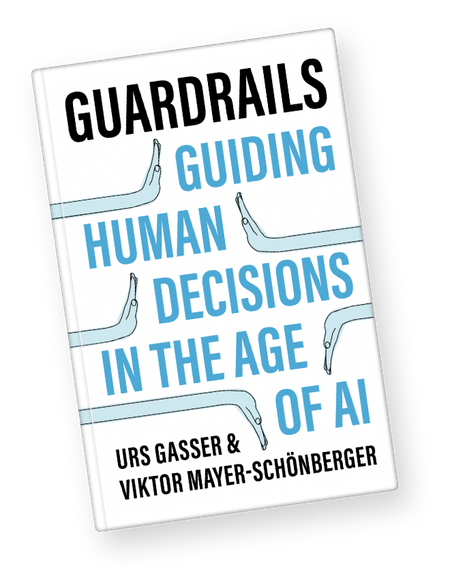In contrast, in Guardrails, the authors suggest that in the age of AI, a focus on data is mistaken, or at least dangerously incomplete. Because AI's real promise isn't better access to insights; it is improved decisions. The more we realize humans' cognitive flaws and experience the power of data-driven machine learning, the more we are tempted to delegate decision agency to the machine. What we need to focus on is no longer network governance, nor data governance, it's decision governance. And for this focus, we are conceptually ill prepared. To jump-start the discussion, Guardrails puts forward four design principles for decision governance and suggest that the real innovation we need to make it happen is less technical than social.
“Wise and fluent, erudite yet practical … Guardrails should move to the top of the pile on all bedside tables.”— Richard Susskind, author of Tomorrow’s Lawyers: An Introduction to Your Futures
“delightfully wide-ranging and eminently readable”— Mark Lemley, Stanford University
“Clear-eyed and gripping … a much needed strategy to guide humanity’s future”— Darren Walker, president of the Ford Foundation
“… a timely contribution to both the theory and practice of governance in a critical moment in history …”— Doreen Bogdan-Martin, secretary-general of the International Telecommunication Union
“An impressively detailed and useful book that is also short, fascinating, and readable …”— Joanna Bryson, Science
“... meticulously researched, insightful and cleanly argued.”— Jeffrey Mazo, Culture and Society
Guardrails

As we progress in the digital age, the locus of power and thus our focus of regulation changes. It used to be the network: Who has what kind of connectivity, who controls the network's bottlenecks including the ability to store and process information, which interactions will the network allow to take place, and which will it retard, reduce, and restrict? What virtual spaces and platforms would emerge, and how would they exercise and project power? More recently, our focus turned to data: Who can collect and utilize data? What patterns do massive amounts of data reveal that smaller sets hide, and who gets to see these insights? What will machines learn from data? Accordingly, data governance and the geopolitics of information have become hot topics.

Book tour



Data Governance Hub @ George Washington University hosts virtual Book Talk – Guardrails

Privacy Book Club at CDDP


CEPS discusses Guardrails · Discussants: Prof. Dr. Andrea Renda and Prof. Dr. Aleksandra Przegalińska


CPDP Book Club discusses Guardrails · Discussants: Prof. Dr. Mireille Hildebrandt and Prof. Dr. Joris von Hoboken

Book Talk · ETH Zurich, AI Ethics and Policy Network

Book Talk and Signing · AI Governance Center, Electronic Transactions Development Agency
Media


Governing society with flexible AI: Policy that prioritizes human agency is possible, even in an age of artificial intelligence.

Guardrails: Guiding Human Decisions in the Age of AI

Guardrails: Guiding Human Decisions in the Age of AI

Guiding Human Decisions in the Age of AI with Oxford Professor Viktor Mayer-Schönberger

Runaway Tech: The Conditions for AI Guardrails



